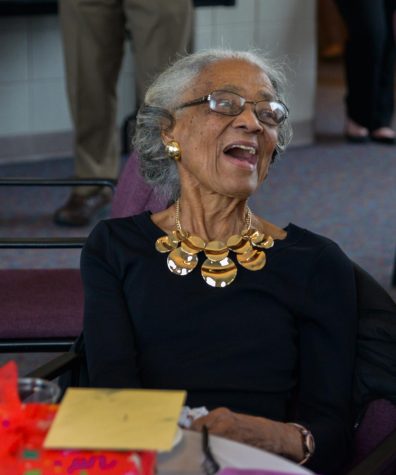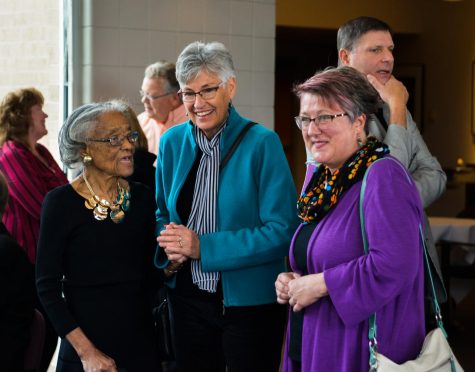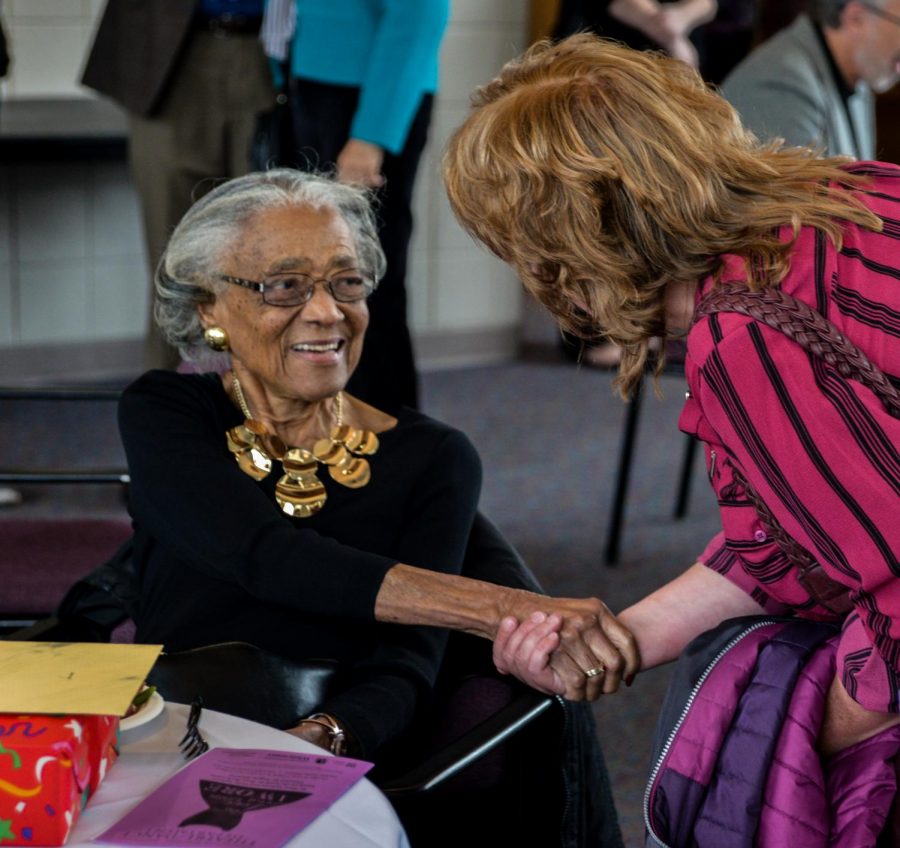Remarkable Warhawk becomes centenarian
UW-Whitewater’s first black faculty member turns 100 years old
Hicklin, in good spirits, smiles and laughs during her birthday reception.
October 22, 2018
It is not every day that students and faculty members at the University of Wisconsin-Whitewater have the opportunity to recognize and celebrate someone who played a significant role in the university’s history.
Last week, Warhawks had that chance while celebrating Fannie Hicklin’s 100th birthday.
Hicklin, the first black faculty member on campus and whom the Hicklin Theatre in the Center of Arts is named after, became a centenarian July 21, 2018. A reception was held Oct. 14 in conjunction with “Love, Loss, and What I Wore” to celebrate Hicklin’s life so far in Fern Young Terrace.
“I remember she always used to say, ‘discipline,’ and she was right,” said Leslie LaMuro, a former student of Hicklin’s. “She was disciplined in body and mind and expected that from the rest of us. Many students who had her as an instructor talk about how she has been one of those professors that has left an indelible mark in their lives, and she definitely did that.”
Hicklin was born July 21, 1918 on the campus of Talladega College in Alabama, an integrated liberal arts school in a state that was then racially segregated. Her father, Demus Frazier, graduated from Talladega in 1917 and was superintendent of the school’s farm.

Hicklin, in good spirits, smiles and laughs during her birthday reception.
As a young girl, Hicklin took an early interest in theatre during second grade. She enjoyed creating plays with friends and performing them for parents and teachers.
Hicklin said something she enjoyed from theatre was “the fact that you are dealing with people, and you are trying to get people to interpret others, and to get out of themselves and into the role.”
She later developed an interest in foreign languages after discovering her father’s Latin books, which inspired her to pursue a bachelor of arts degree in foreign languages. She graduated from Talladega College and went on to earn a master’s degree from the University of Michigan and a doctorate degree in speech from the University of Wisconsin-Madison.
It wasn’t until 1964 that a new position as professor of theatre, dance and speech communication at UW-Whitewater would allow Hicklin to channel her passions for theatre and performance to enrich those programs at UW-W.
From the moment she arrived in Whitewater, Hicklin remembers always feeling welcome on campus and doesn’t remember facing discrimination.
“Prejudices I’ve known, but really I never felt any here in Whitewater,” Hicklin said. “Small, though it is, and rural. I could be a normal person just like anybody else, so I am very fond of Whitewater.”

Fannie Hicklin is greeted by friends, former students and UW-Whitewater faculty Oct. 14. in Fern Young Terrace. She is pictured talking with retired faculty member Robin Pettersen and Anna DeWind Walls.
During the course of her 24-year career at Whitewater, she directed more than 50 theatre productions and eventually became chair of the department.
Her accomplishments are many and go beyond UW-W. Hicklin was the first black President of the State Historical Society of Wisconsin Board of Curators and was the Regional Chair of the Danforth Associates Program, which aims to improve the quality of teaching and learning on university campuses.
At 100 years of age, Hicklin is still vibrant and clearly well-loved by those who know her. On occasion she can be found on campus as she still enjoys attending theatre events.
Throughout her life, Hicklin has enjoyed seeing how UW-W has changed over the years, and praises how far it has come.
Hicklin is especially glad to see how Whitewater has built a strong program for students with disabilities. She sees it as one of the many great changes Whitewater has made, and she is always proud to recommend prospective students to attend UW-W.
“I have high regard for the changes that Whitewater has made over these many years that have been very wholesome changes,” Hicklin said. “I am pleased at how this institution, which initially was just one in small town, primarily with business being the major emphasis, has grown now to be a true university. Now, you feel that Whitewater is out there offering top-notch things in every area.”
At the reception, Hicklin said her fellow Warhawks are her family.














Charles A. Myers, D.D.S. • Oct 27, 2018 at 1:05 pm
Congratulations, Dr. Hicklin ❤️❤️
I hope you are enjoying the “Dega” tee shirt I gave to you at the meeting in Atlanta last year. I feel profoundly blessed to have shared with such an amazing & marvelous person as you. May the LORD continue to shadow you beneath HIS hand!!!
Charles A. Myers